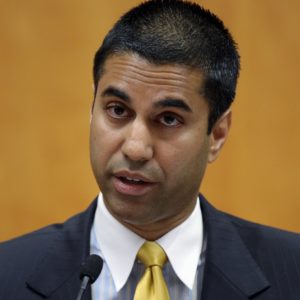The U.S. Senate voted Monday to reconfirm Ajit Pai to head the Federal Communications Commission after days of opposition by Democrats, who took turns slamming Pai on and off the floor for deregulatory actions aimed at rolling back net neutrality and green-lighting mega mergers since his appointment by President Donald Trump.
Monday’s 52-41 vote reconfirmed Pai for another five-year term retroactively beginning in June, when his previous term expired (FCC rules allow commissioners to serve until the end of the calendar year of their last term). Republicans had planned to reconfirm Pai along with a handful of other executive appointments earlier this summer, but Democrats wanted Pai dropped from the deal the two sides brokered, setting him up for his own vote later.
Democrats used the opportunity to shine a light on Pai’s divisive tenure at the head of the FCC since January. In the months since being promoted from one of the FCC’s two minority Republican commissioners during the Obama administration, Pai has enacted an aggressive deregulatory agenda that’s received heavy criticism from the left.
The most recent bout of criticism came in a Friday letter to Pai from more than half the Democrats in the Senate. Democrats blasted the FCC chairman for weakening media ownership rules that paved the way to the pending $3.9 billion merger of Sinclair Broadcast and Tribune Media, the two largest broadcasters in the U.S.
“The nation’s media ownership limits have directly contributed to the trust that Americans have placed in their local broadcasters,” the letter by Sen. Bill Nelson of Florida, the ranking Democrat on the Senate committee charged with overseeing the FCC, reads. “Eliminating these rules and creating massive broadcast conglomerates directly contravenes the will of Congress and the public interest.”
Not long after taking the top office, Pai revived the “ultra-high frequency (UHF) discount,” an FCC loophole in Congress’s national broadcasting cap limiting any one company from reaching more than 39 percent of the national audience. The discount allows broadcasters to count only 50 percent of the audience reached by stations broadcasting in UHF, a format that was considered weak and unreliable when the discount was enacted in the 1980s. The evolution of digital TV technology has eliminated the technological difference, and the Obama administration closed the loophole last year.
Sinclair, which promotes an apparent conservative news bias it disseminates to local stations across the country, hovered near the cap when rumors swirled in March it may buy Tribune Media. The FCC reinstated the UHF discount a month later, lowering Sinclair’s audience reach on paper to 24 percent and setting the stage for it to buy Tribune. Two weeks later the deal was announced, and if approved, will take Sinclair from 173 stations to 215 and allow it to reach 72 percent of American households.
“Many find the timing of your media ownership actions troubling and question whether they were taken knowing that they were essential to the business plans of a single company,” the letter signed by Sens. Al Franken of Minnesota, Bernie Sanders of Vermont, and 22 others reads. Democrats in the House raised similar flags over the deal, as well as recent meetings between Pai, Sinclair executives, and Trump, who brokered a deal with the broadcaster for favorable coverage during the 2016 presidential election.
“At every turn, Chairman Pai chooses corporate interests over consumers,” Massachusetts Sen. Ed Markey, who frequently weighs in on FCC issues, said on the Senate floor last week. He added the FCC now stands for “Forgetting Consumers and Competition,” and recalled Pai’s suspension of heightened privacy standards for internet providers.
Also speaking on the floor in the week leading up to Pai’s Monday vote, Oregon Sen. Ron Wyden (D) said Pai’s “track record demonstrates he is not in the consumer’s corner.”
Nelson joined his colleagues on the Senate floor, saying “the vast majority of the actions of Chairman Pai have served to eliminate competitive protections, threaten dangerous industry consolidation, make the internet less free and less open, and weaken critical consumer protections for those most vulnerable.”
Speaking shortly before Monday’s vote Sen. Maria Cantwell (D, Wash.) brought up Pai’s pending plan to potentially undo all of the FCC’s net neutrality rules, including those barring internet providers from blocking, throttling, or prioritizing web traffic.
“Undoing the existing net neutrality laws that are on the books I think is not in the public interest,” Cantwell said.
In a statement released after the vote Pai said his agency “has focused on bridging the digital divide, promoting innovation, protecting consumers and public safety, and making the FCC more open and transparent.”
“With today’s vote,” he said, “I look forward to continuing to work with my colleagues to advance these critical priorities in the time to come.”
Republicans also spoke in support of Pai as he works to address the challenges of an increasingly tech-driven economy.
John Thune, Chairman of the Senate Commerce Committee, said in a speech: “I can think of no better pick to lead the FCC as it works to address a host of issues at the heart of our interconnected economy.”

